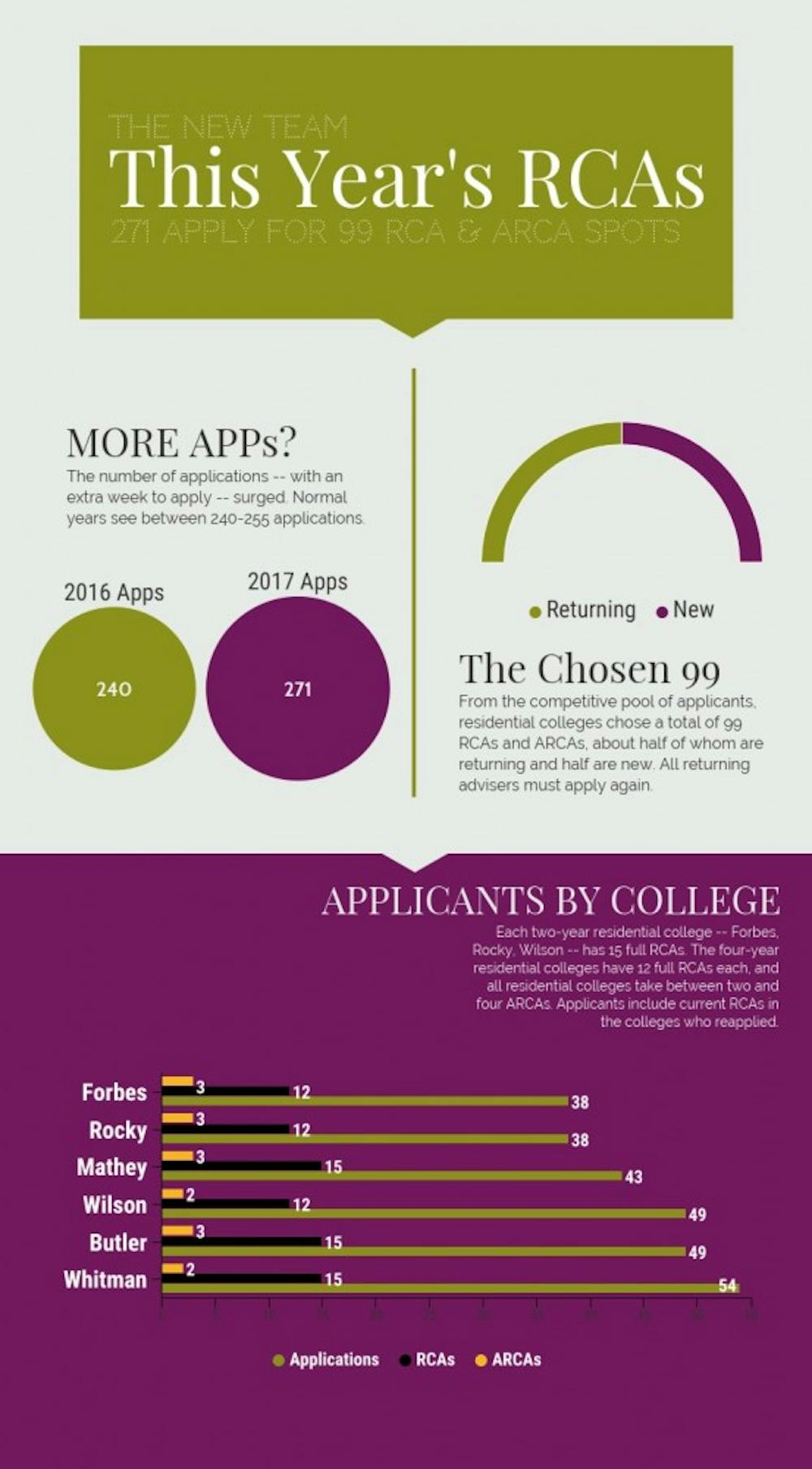“My RCA was one of the most amazing human beings I have ever met,” said Fares Marayati ’19, “She always made herself available even in the middle of her busy schedule and we all felt like we always had someone to go to when we just needed to talk.”
Marayati added that his RCA provided the supportive space to help each freshman in the advisee group grow as a person and establish “unusually close” and long-lasting friendships with every ’zee. His RCA, Jordy Lubkeman ’16, was in Forbes College.
Inspired by similar experiences with past RCAs, 271 students applied for 99 RCA and assistant residential college advisor positions this past winter, a sizable increase from the typical number of 240–255 applicants, Associate Dean of Undergraduate Students Michael Olin said.
According to Olin, approximately 37 percent of student applicants for the position of residential college adviser were offered a position for the 2017–18 academic year.
RCAs from this academic year are not guaranteed reappointment, and there were approximately 50 projected new (non-returning) RCA openings.
For the two-year residential colleges, which only house freshmen and sophomores, Wilson College accepted 15 RCAs and two ARCAs, Rockefeller College accepted 15 RCAs and three ARCAs, and Forbes College accepted 15 RCAs and three ARCAs.
For the four-year colleges, which have upperclassmen and underclassmen, Butler College accepted 12 RCAs and three ARCAs, Whitman College accepted 12 RCAs and two ARCAs, and Mathey College accepted 12 RCAs and three ARCAs.
While ARCAs are not assigned to a specific advisee group, they aid RCAs with any management duties and would potentially replace any RCAs who have to vacate the position.
Olin noted in an email that the position of RCA is of “critical importance” to the University experience, especially for first-year students. During Orientation, RCAs are tasked with engaging in conversations about alcohol, sexual assault, and other campus issues with their freshman advisee groups while also planning enjoyable activities to ease the transition into the University.
Because the RCA position is one of great responsibility, Olin noted that a successful RCA will possess a variety of skills, including a concern for and willingness to assist others, as well as an understanding of the experience of students from underrepresented groups and commitment to supporting the needs of those students.
The ideal RCA also demonstrates the ability and willingness to help establish and maintain a safe environment and to address violations of University policy if and when such violations are observed, Olin said. He added that RCAs should also have the ability to respond to a wide variety of situations with students and make referrals to the appropriate University resources.
The selection process holds similarly elevated standards, starting with the submission of an online application consisting of basic personal information, five short answer questions, and letters of recommendation. The application opened on Oct. 27 and closed on Dec. 2.
Applicants were then separated into pools according to college choice and to the anticipated number of new RCA openings for each college, in order to ensure that the acceptance rate was even across all colleges. This year, the University was able to honor every applicant’s first, second, or third choice, Olin said.
Interviews, which are held by the deans or the heads of the applicants’ desired residential college, occurred during reading period and typically comprised an individual interview and a group interview that tested applicants on how well they would deal with hypothetical scenarios and how well they work in a team.
The interview selection team considered factors such as the candidate’s demonstrated interest in and aptitude for the RCA position, commitment to and involvement in the campus community, academic record, and disciplinary standing.
While several newly accepted RCAs expressed their satisfaction with the RCA selection process as a generally positive experience, Nick Wu ’19 admitted that the group interviews were not his favorite portion.
“The scenarios and activities they had us do were kind of fun, but the fact that we were being evaluated at the same time felt off to me,” said Wu, who will be an RCA in Mathey College next year.
Each residential college officially sent out their offers for the RCA positions during Intersession.
Rachel Linfield ’19, who will be an RCA in Rockefeller College, noted that her desire to become an RCA was born out of her rewarding experience as a summer camp counselor during the past three years, in addition to the great resource that her RCA was for her during her freshman year.
“During my time as a camp counselor, I felt that I was impacting younger girls in multiple ways, but I also felt that I learned a lot about myself in the process,” Linfield said. “I am so excited by the idea that I will be impacting the experience of new students at Princeton, and I hope my ’zees will always come to my room for help, for advice, or just to hang out.”
Wu said that the best he can do for his future advisee group next year is to be as supportive and energizing as possible.
“They all already have the tools to succeed, but sometimes it’s just a little tweak in mindset, or some random tips that they need to reach that potential,” Wu said.





